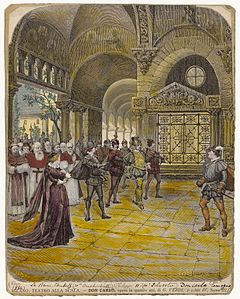| Don Carlos | |
|---|---|
| Grand opera by Giuseppe Verdi | |
 Carlo Cornaglia's depiction of Act IV (the original Act V) in the 1884 La Scala production | |
| Librettist | |
| Language | French, also in Italian translation |
| Based on | Don Carlos by Friedrich Schiller (and incidents borrowed from a contemporary play by Eugène Cormon) |
| Premiere | 11 March 1867 Salle Le Peletier (Paris Opéra) |
Don Carlos[1] is an 1867 five-act grand opéra composed by Giuseppe Verdi to a French-language libretto by Joseph Méry and Camille du Locle. Its basis is Friedrich Schiller's play Don Karlos, Infant von Spanien, but it borrows from Eugène Cormon's play Philippe II, Roi d'Espagne,[2] as well. It is often performed in Italian translation, as Don Carlo.
The plot recounts conflicts in the life of Carlos, Prince of Asturias (1545–1568). Though he was betrothed to Elisabeth of Valois, part of the peace treaty ending the Italian War of 1551–59 between the Houses of Habsburg and Valois demanded that she be married instead to his father Philip II of Spain. It was commissioned and produced by the Théâtre Impérial de l'Opéra (Paris Opera) and given its premiere at the Salle Le Peletier on 11 March 1867.
The first performance in Italian was given at Covent Garden in London in June 1867. The first performance in Italy was in Bologna in October 1867, also in Italian translation. After some revisions by Verdi, it was performed in Italian in Naples in November/December 1872. Verdi was also responsible for a short four-act "Milan version" in which the first act was removed and the ballet omitted (performed in Milan in January 1884 in Italian translation) but also apparently approved a five-act "Modena version" in which the first act was restored but the ballet still omitted (performed in Modena in December 1886, also in Italian translation). Around 1970, substantial passages of music cut before the premiere were discovered in Paris archives, giving rise to at least one additional version that can be ascribed to Verdi: the version he prepared for the Paris Opera in 1866, before any cuts were made.[3] No other Verdi opera exists in so many authentic versions. At its full length (including the ballet and the cuts made before the first performance), it contains close to four hours of music and is Verdi's longest opera.[4]